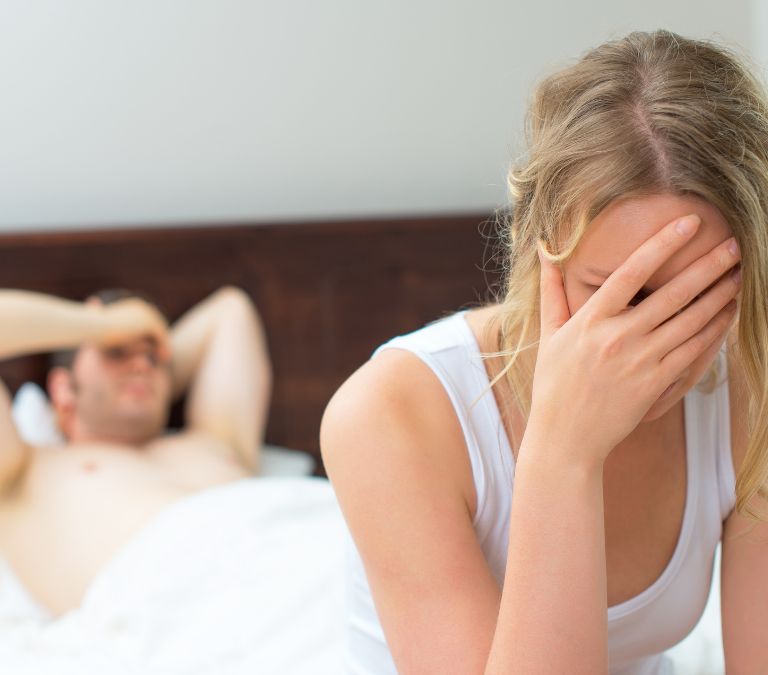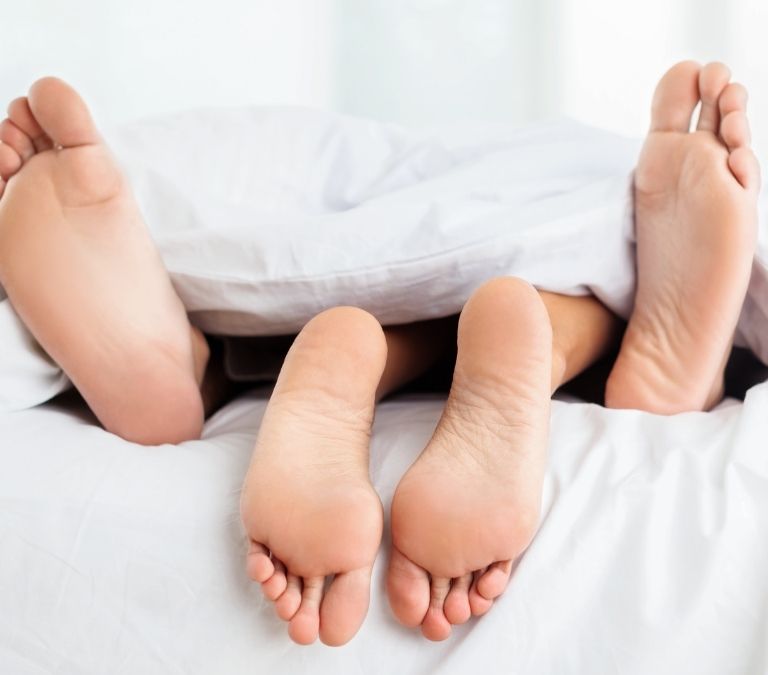Article Insights & Reflections
Synopsis: This article addresses the most common sexual health changes in midlife and what actually helps. It covers medical options and everyday habits that restore comfort, confidence, and connection.
Top 5 Questions Answered:
- What causes pain or low libido around menopause?
- Is local estrogen safe and effective for dryness?
- Can testosterone play a role for women?
- Which lifestyle factors improve sexual well-being?
- How should I discuss concerns with my partner and clinician?
Due to the lack of estrogen and testosterone, a woman’s body and sexual drive may change after menopause. Women going through menopause or who have just gone through it may find less open to physical contact and less likely to get excited by it. It could also affect your sexual health.
As estrogen levels drop, vaginal blood flow may slow down. Because of this, the vagina may become too dry for a pleasant experience, but there are ways to help.
 During menopause, many women say they don’t want to be sexual as much. It also happens often in women before menopause. Many things can lead to low libido. Most of the time, a lack of sex drive is caused by changes in hormones, physical problems, or mental or emotional problems.
During menopause, many women say they don’t want to be sexual as much. It also happens often in women before menopause. Many things can lead to low libido. Most of the time, a lack of sex drive is caused by changes in hormones, physical problems, or mental or emotional problems.
 The most common symptoms of dyspareunia are: Burning, itching, or stabbing pain, similar to menstrual cramps, in the vagina, urethra, or bladder during or after penetration deeply in the pelvis, but only with certain partners or conditions when using a tampon.
The most common symptoms of dyspareunia are: Burning, itching, or stabbing pain, similar to menstrual cramps, in the vagina, urethra, or bladder during or after penetration deeply in the pelvis, but only with certain partners or conditions when using a tampon.

 You could greatly improve your quality of life with the right workout plan. It may help you reach your ideal weight, get stronger and healthier, and be the best version of yourself. On the other hand, there are more benefits to being active. On the contrary, many studies have shown that exercise raises libido.
Here are five things you can do daily to improve your overall health and, by extension, your sexual health and libido.
You could greatly improve your quality of life with the right workout plan. It may help you reach your ideal weight, get stronger and healthier, and be the best version of yourself. On the other hand, there are more benefits to being active. On the contrary, many studies have shown that exercise raises libido.
Here are five things you can do daily to improve your overall health and, by extension, your sexual health and libido.
- Consider your health and the medications you take.
- Just chill out and take some time off.
- Now is the time for you to think outside the box.
- Spend some time talking with your partner.
- Talk to your doctor or nurse.
Causes Of Low Sex Drive During Menopause
 During menopause, many women say they don’t want to be sexual as much. It also happens often in women before menopause. Many things can lead to low libido. Most of the time, a lack of sex drive is caused by changes in hormones, physical problems, or mental or emotional problems.
During menopause, many women say they don’t want to be sexual as much. It also happens often in women before menopause. Many things can lead to low libido. Most of the time, a lack of sex drive is caused by changes in hormones, physical problems, or mental or emotional problems.
- Changes in the levels of Hormones
-
If the tissues in the genital area are too dry, sex can be unpleasant or even painful.
-
It might be harder to get sexually aroused when hormone levels go down.
-
Sleep problems that make you sleepy or irritable
-
Having hot flashes that make it hard for people to touch you
-
Changes in the body, like weight gain, which can make people feel insecure and hurt their self-image.
-
Some women have trouble with sex during and after menopause because they no longer feel like women. On the other hand, it can be hard and scary to move on to a new stage of life.
- Health concerns
-
If you have trouble getting or staying in an orgasmic state, or if you feel pain during sex, your sexual desire may go down.
-
Arthritis, cancer, diabetes, high blood pressure, coronary artery disease, and neurological disorders are some of the nonsexual illnesses that have been shown to affect sex drive.
-
Antidepressants called selective serotonin reuptake inhibitors can tame the urge to have sex.
- Lifestyle
- Mental and emotional issues
- Dyspareunia
Causes Of Dyspareunia
Dyspareunia can have several potential causes. It could be a sign of a health problem in some women. Some women experience both physical pain and mental turmoil at the same time. Most of the time, dyspareunia is caused by something in the body. Here are a few of the most popular:-
Vulvodynia, which is a pain in the area around the vulva
-
Vaginitis, which is inflammation of the vagina
-
Vaginismus, which is when the muscles around the vulva tighten on their own
-
Injury or trauma from childbirth,
-
An accident
-
An episiotomy
-
A hysterectomy, or pelvic surgery
-
Skin problems like cracks, itchiness, or burning
-
Infections like yeast or urinary tract infections (UTIs);
-
Endometriosis and cystitis which are both diseases of the pelvic lining (PID)
-
Chemotherapy and ionizing radiation that cause women with uterine fibroids to have Irritable Bowel Syndrome (IBS).
-
When the muscles on the pelvic floor are tight because of stress.
-
Worry, sadness, or shame, about their sexuality or appearance.
-
Pills like those used to stop pregnancy
-
Having been abused or used sexually in the past.
-
Cancer, rheumatoid arthritis, diabetes, and problems with the thyroid.
-
Vaginal dryness:
Symptoms Of Dyspareunia
 The most common symptoms of dyspareunia are: Burning, itching, or stabbing pain, similar to menstrual cramps, in the vagina, urethra, or bladder during or after penetration deeply in the pelvis, but only with certain partners or conditions when using a tampon.
The most common symptoms of dyspareunia are: Burning, itching, or stabbing pain, similar to menstrual cramps, in the vagina, urethra, or bladder during or after penetration deeply in the pelvis, but only with certain partners or conditions when using a tampon.
Who Usually Gets Dyspareunia?
Men and women can both have dyspareunia, but women are more likely to have it. Postmenopausal women frequently get dyspareunia. More things can affect a woman’s sexual desire before, during, and after menopause. For example;-
Sleep problems
-
Mood problems like anxiety and depression
-
Stress/Medications
-
Health problems
How Couples Can Go Through This Period Together
If you’re a woman and having painful sex, you should tell your partner what’s happening and how it makes you feel. You should also talk about how you feel guilty about not having sexual relations and how being unable to have sexual relations will be seen as a sign of rejection. You should also say how important it is for you to love and be loved. If your partner believes you and agrees that the problem is serious, it will greatly relieve you. When the disease is at its worst, helping women in their everyday lives can make it easier for them to deal with it. If painful sex is a problem for you, trying different positions or ways to do it might help. One example is showing affection in a slow, casual way that doesn’t always involve touching. If you and your partner want to figure out what’s hurting your relationship, it’s best to be as honest and open as possible. You might be able to improve your close relationships by learning what not to do. If a man finds out that his partner hurts during sex, it could make him feel awkward or uncomfortable. Sexuality can be a touchy subject in close relationships. Most of the time, being unable to have children makes life much harder. You might feel better if you went to see a sex therapist. Some women can enjoy sexual contact, but only if it is light or doesn’t go very deep. If you want to, you could try pre-play and lubricants. If there is enough time for foreplay, some women can have good sexual experiences. Find out how much help you’ll need, look for answers, and, if you need it, ask for help. Sometimes, a woman might not need to go to the doctor to relieve sexual pain. If women have painful sex after giving birth, waiting at least six weeks before having sex again might help. Try not to worry and wait it out. Women with sexual pain might need to go to the doctor. When medical care has ruled out other causes of sexual pain, sex therapy could help a person feel better. Finding other ways to connect might be best until the real problems are fixed. You and your partner could try other ways to get closer until you both feel more comfortable with penetration. Sensual massage, kissing, oral sex, and mutual masturbation can help you feel whole if you don’t have physical intimacy.How Can I Treat Vaginal Dryness After Menopause?

- If your vaginal tissues hurt, try a low-dose estrogen cream, pill, or ring.
- Lubricants that soften and keep the skin moist
- Stay away from condoms that contain the ingredient N-9 (nonoxynol-9).
Do I Still Need To Practice Safe Sex After Menopause?
Yes, you should still use a condom after menopause if you are not in a monogamous relationship. In a monogamous relationship, you and your partner agree to only get sexual with each other. Before you and your partner had unprotected sex, you were tested for STIs or STDs. Using a condom is the best way to avoid getting a sexually transmitted disease. Some STIs can be passed on or gotten without a come, so it is important to use a condom before the penis goes into the mouth, vagina, or anus. After menopause, you are more likely to get a sexually transmitted infection (STI) if you don’t use protection. After menopause, many women feel more dryness or pain in their vaginal area; This can make you more likely to get small cuts and tears during sexual activity, making you more likely to get a sexually transmitted infection. If you’re over 40 and want to avoid getting pregnant, you can take the pill, patch, and vaginal ring together, as long as you’re otherwise healthy, don’t smoke and stay at a healthy weight. Some are safer than others, and your doctor can help you decide which one is best for you. But if you’re over 50, you might want to switch to a different method of birth control. You likely won’t need birth control after you turn 55, but you can keep taking the progesterone-only tablet (the “mini-pill”) for as long as you want. Again, once you turn 50, you should switch to a different way to prevent pregnancy.-
The Mirena coil can ease the heavy periods that come with menopause. If the coil is put in after age 45, it can be used as birth control for up to five more years, until age 55, and as part of hormone replacement therapy (HRT).
-
Another option is the contraceptive implant, which can be used until menopause. A copper intrauterine device (copper coil) and condoms are two examples of non-hormonal methods that will not make menopausal symptoms worse.
Importance Of Communication
Talking to your partner about your worries is beneficial to your relationship. Age and long-term health problems, such as heart disease and diabetes, can affect sexual health and satisfaction. Here are a few ways to go about communicating with your partner: Many women may find it hard to deal with the emotional and physical changes that come with menopause, which can be hard for our spouses and other close people to understand. For women to adjust to this new stage of life, they need to be able to talk to their partners about these changes.- Give the right information. Many men might not know much about menopause or feel comfortable talking to their wives about it. So, the first step should be to teach them.
-
Be the one to initially introduce the topic. Men are sometimes afraid to bring it up with their partners because they don’t want her to think they are being critical or judging.
-
Visit your doctor together. Whether you’ve already made an appointment with your doctor or are still waiting, now is a great time to involve your partner in how you handle menopause.
-
Let go of the need to be close in a certain way and make room for others. Oral sex, massage, cuddling, and experimenting with vibrators are some alternatives to penetrative sex that might be easier on the body. Stop being afraid and give them a try. During menopause, you and your partner might benefit from trying new ways to be close.
-
Be truthful. Even though it may seem obvious, being honest with each other is very important if you want to help each other through this change.
-
Share your new desires and feelings.”Are you taking longer to get excited? Are you worried about how you look changing? Other than vaginal sex, are there other ways to enjoy physical connection, like oral sex or massage? When are you most comfortable?” these are important questions to have in mind when communicating with your partner. Be sure not to miss any little detail.
-
View menopause as a chance. When discussing menopause, it’s important to point out that it’s not all bad. In many cases, it’s the other way around.
-
Maintain constant, brief communication. It might be scary to sit down and talk about all of your sexual worries at the same time. Instead, you could use a timer to make sure your conversation doesn’t last longer than fifteen to twenty minutes. You can both take time apart to think about what’s been said.
-
Tell him exactly how you feel. Tell someone if the dryness in your vaginal area is making you feel bad. Your partner probably worries if something is hurting you or not. Bring up the issue if your decreased ease makes you less interested and happy. If you talk about it, you might be able to find a solution that works for everyone.
-
Find out what will help you feel better. A lot of postmenopausal and menopausal women say that they need more time for foreplay to get them fully aroused. You can try out different positions to see what feels best. “Since sexual preferences tend to change over time, it’s important to be open and honest with your partner about what you do and don’t like to do in the bedroom. Even if the topic makes you feel awkward, remember that your partner wants to know how they can make sex more fun for you.
-
Talk to a professional about it. If you and your partner can’t find a place to start talking or are having trouble talking to each other, it might help to bring in a third person. You can have this talk with the help of a mental health professional, a sex therapist, or even your gynecologist.
Can I Get Pregnant During Menopause?
The answer is yes, even if you don’t get periods. As women get older, their fertility naturally decreases, making it harder for them to get pregnant. But if you are sexually active and don’t want to get pregnant, you shouldn’t stop using birth control until you know you have gone through menopause. If you are under 50, you should use effective birth control until you haven’t had a period for two years. Women over 50 should use birth control for at least a year after their last period; This will help them avoid getting pregnant. You might still get your period at age 55, but you probably won’t need birth control. You will reach menopause, after which you will no longer be able to have children. Because there are more risks involved, pregnancy after age 35 is called a “later in life” pregnancy. Some of them are listed below:-
Gestational hypertension also called pregnancy-induced hypertension, and diabetes are both conditions that can happen during pregnancy (gestational diabetes)
-
A life-threatening ectopic pregnancy is when the embryo implants somewhere other than the uterus.
-
A higher chance of needing a cesarean birth (surgical delivery).
-
Problems during labor and delivery, such as bleeding or long labor, or problems already present in the mother or the baby (such as Down syndrome).
7 Foods That Will Boost Your Libido
There’s more to boosting your mood than the norm. Experts agree that eating well is crucial to keep your sexual desire strong. A healthy, well-balanced diet will make you look and feel better and give you the nutrients you need to keep your libido in good shape. A bad diet can make you tired, sluggish, and sick, which is bad for your efforts to feel energized. Having a strong sex desire also depends on other things, like being at a healthy weight, talking to your partner, and getting enough sleep. There’s no harm in making a few small changes to your diet. We’ve listed some of the best meals that increase libido below.- Pine nuts
- Almonds
- Avocados
- Black Raspberries
- Ginseng
- Watermelon
- Oatmeal
5 Exercises That Can Boost Libido
 You could greatly improve your quality of life with the right workout plan. It may help you reach your ideal weight, get stronger and healthier, and be the best version of yourself. On the other hand, there are more benefits to being active. On the contrary, many studies have shown that exercise raises libido.
Here are five things you can do daily to improve your overall health and, by extension, your sexual health and libido.
You could greatly improve your quality of life with the right workout plan. It may help you reach your ideal weight, get stronger and healthier, and be the best version of yourself. On the other hand, there are more benefits to being active. On the contrary, many studies have shown that exercise raises libido.
Here are five things you can do daily to improve your overall health and, by extension, your sexual health and libido.
- Yoga
- Walking
- Strength Training
- Swimming
- Kegels
Post Views: 2,716







